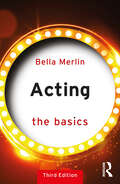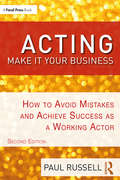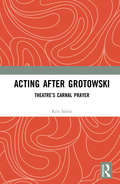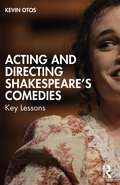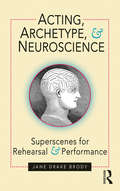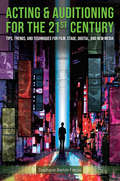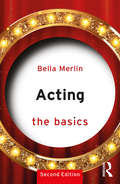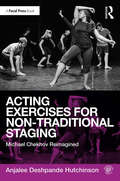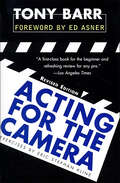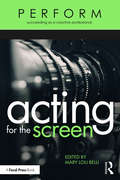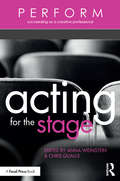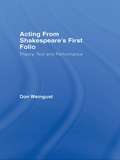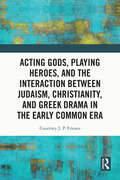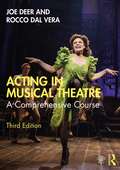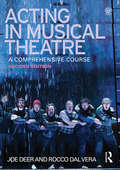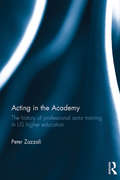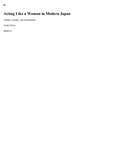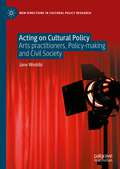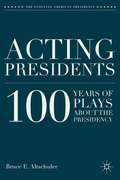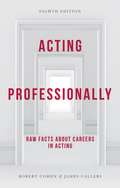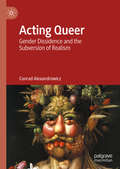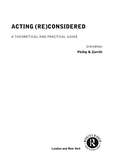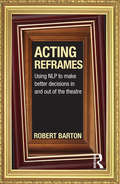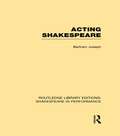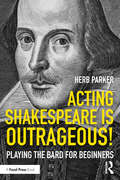- Table View
- List View
Acting: The Basics (The Basics)
by Bella MerlinActing: The Basics 3rd Edition is a dynamic response to recent societal and entertainment industry changes, focusing on inclusion, diversity and equity, and the actor's trajectory from training to rehearsal to performance on stage and screen, with hands-on tools and global perspectives. The book offers vital ways of building a practical acting toolkit, through breath, body, voice, emotions, imagination and spirit. We begin with a socio-cultural look at actor as magician, storyteller, healer and social changer. Throughout, there are insights from Black, Indigenous, First Nations, South/East Asian, intercultural and feminist practitioners, together with methods focusing on disability and accessibility, intimacy directives, mindfulness and intersectionality. Key 'canonical' figures still feature (e.g., Stanislavsky, Meisner, Brecht and Suzuki) with re-visioned perspective. Scattered throughout are post-COVID insights, plus expanded sections on screen acting (including self-tapes) and Shakespeare. This book is useful for beginner or expert, as it's always helpful getting back to basics. Because the author is both an actor and an actor trainer, the tools are steeped in user-friendly application. At the same time, transferable skills (e.g., dynamic listening and empathy) are shown as relevant to everyone. With a glossary of terms and useful online suggestions (including blogs, videos and podcasts), this is ideal for anyone learn anew about the practice and history of acting, or to take their acting and teaching into new terrain.
Acting: How to Avoid Mistakes and Achieve Success as a Working Actor
by Paul RussellIn ACTING: Make It Your Business, Second Edition, award-winning casting director Paul Russell puts the power to land jobs and thrive in any medium—stage, film, television, or the Internet—directly into the hands of the actor. This blunt and practical guide offers a wealth of advice on auditioning, marketing, and networking, combining traditional techniques with those best suited for the digital age. Well-known actors and powerful agents and managers make cameos throughout, offering newcomers and working professionals alike a clear-eyed, uncensored perspective on survival and advancement within the entertainment industry. This second edition has been updated and expanded to include the following: More stars of screen and stage sharing acting career strategies Digital audition techniques for screen and stage, including how best to self-tape New tools to master modern marketing, both digital and traditional with innovation Expanded actor resource listings Additional bicoastal talent agents and managers spilling secrets for obtaining representation, and tips for successful actor-to-representation partnerships New insights on audition techniques An excellent resource for career actors, beginning and amateur actors, as well as students in Acting I and II, Auditions, and Business of Acting courses, ACTING: Make It Your Business provides readers with invaluable tools to build a successful, long-lasting acting career.
Acting after Grotowski: Theatre’s Carnal Prayer
by Kris SalataFor whom does the actor perform? To answer this foundational question of the actor’s art, Grotowski scholar Kris Salata explores acting as a self-revelatory action, introduces Grotowski’s concept of "carnal prayer," and develops an interdisciplinary theory of acting and spectating. Acting after Grotowski: Theatre’s Carnal Prayer attempts to overcome the religious/secular binary by treating "prayer" as a pre-religious, originary deed, and ultimately situates theatre along with ritual in their shared territory of play. Grounded in theatre practice, Salata’s narrative moves through postmodern philosophy, critical theory, theatre, performance, ritual, and religious studies, concluding that the fundamental structure of prayer, which underpins the actor’s deed, can be found in any self-revelatory creative act.
Acting and Directing Shakespeare's Comedies: Key Lessons
by Kevin OtosActing and Directing Shakespeare’s Comedies: Key Lessons outlines a clear, effective process for acting Shakespeare’s comedies. This book lays out core principles and useful exercises that help the reader better understand, expereince, and implement Shakespeare's comedic design. Building off of modern acting methods as well as contemporary Clown, classical Commedia, and verse-speaking techniques, the author guides the reader toward interpretive and performance choices that are original, justified, and entertaining. Included are clear examples and detailed case studies that illuminate and reenforce these key lessons. This accessible book is for actors, directors, students of Shakespeare, and those who want a fuller, richer awareness of the possibilities within Shakespeare’s comedies and a clear, pragmatic process for creating those performances.
Acting, Archetype, and Neuroscience: Superscenes for Rehearsal and Performance
by Jane Drake Brody"How do we move actors into the less accessible regions of themselves and release hotter, more dangerous, and less literal means of approaching a role?" Superscenes are a revolutionary new mode of teaching and rehearsal, allowing the actor to discover and utilize the primal energies underlying dramatic texts. In Acting, Archetype, and Neuroscience Jane Drake Brody draws upon a lifetime’s experience in the theatre, alongside the best insights into pedagogical practice in the field, the work of philosophers and writers who have focused on myth and archetype, and the latest insights of neuroscience. The resulting interdisciplinary, exciting volume works to: Mine the essentials of accepted acting theory while finding ways to access more primally-based human behavior in actors Restore a focus on storytelling that has been lost in the rush to create complex characters with arresting physical and vocal lives Uncover the mythical bones buried within every piece of dramatic writing; the skeletal framework upon which hangs the language and drama of the play itself Focus on the actor’s body as the only place where the conflict inherent in drama can be animated. Acting, Archetype, and Neuroscience weaves together a wealth of seemingly disparate performance methods, exciting actors to imaginatively and playfully take risks they might otherwise avoid. A radical new mixture of theory and practice by a highly respected teacher of acting, this volume is a must-read for students and performance practitioners alike.
Acting & Auditioning for the 21st Century: Tips, Trends, and Techniques for Digital and New Media
by Stephanie Barton-FarcasActing & Auditioning for the 21st Century covers acting and auditioning in relation to new media, blue and green screen technology, motion capture, web series, audiobook work, evolving livestreamed web series, and international acting and audio work. Readers are given a methodology for changing artistic technology and the global acting market, with chapters covering auditions of all kinds, contracts, the impact of new technology and issues relating to disabled actors, actors of colour and actors that are part of the LGBTQIA community.
Acting: The Basics (The Basics)
by Bella MerlinNow in a vibrantly revised second editon, Acting: The Basics remains a practical and theoretical guide to the world of the professional actor, which skilfully combines ideas from a range of practitioners and linking the academy to the industry. Retaining a balance between acting history, a discussion of pioneers and a consideration of the practicalities of acting techniques, the new edition includes a discussion of acting for the screen as well as the practicalities of stage acting, including training, auditioning and rehearsing. With a glossary of terms and useful website suggestions, this is the ideal introduction for anyone wanting to learn more about the practice and history of acting.
Acting Exercises for Non-Traditional Staging: Michael Chekhov Reimagined
by Anjalee Deshpande HutchinsonActing Exercises for Non-Traditional Staging: Michael Chekhov Reimagined offers a new set of exercises for coaching actors when working on productions that are non-traditionally staged in arenas, thrusts, or alleys. All of the exercises are adapted from Michael Chekhov's acting technique, but are reimagined in new and creative ways that offer innovative twists for the practitioner familiar with Chekhov, and easy accessibility for the practitioner new to Chekhov. Exploring the methodology through a modern day lens, these exercises are energizing additions to the classroom and essential tools for more a vibrant rehearsal and performance.
Acting for the Camera: Revised Edition
by Tony BarrCulled from Tony Barr's 40 years' experience as a performer, director and acting teacher in Hollywood, this highly praised handbook provides readers with the practical knowledge they need when performing in front of the camera. This updated edition includes plenty of new exercises for honing on-camera skills; additional chapters on imagination and movement; and fresh material on character development, monologues, visual focus, playing comedy and working with directors. Inside tips on the studio system and acting guilds make it particularly helpful for people new to the business, and numerous anecdotes from actors such as Morgan Freeman and Anthony Hopkins and examples from current movies illustrate its many lessons. It is perfect for acting classes, workshops, all actors who work in front of the camera -- and all those who want to.
Acting for the Screen (PERFORM)
by Mary Lou BelliActing for the Screen is a collection of essays written by and interviews with working actors, producers, directors, casting directors, and acting professors, exploring the business side of screen acting. In this book, over thirty show business professionals dispel myths about the industry and provide practical advice on topics such as how to break into the field, how to develop, nurture, and navigate business relationships, and how to do creative work under pressure. Readers will also learn about the entrepreneurial expectations in relation to the internet and social media, strategies for contending with the emotional highs and lows of acting, and money management while pursuing acting as a profession. Written for undergraduates and graduates studying Acting for Screen, aspiring professional actors, and working actors looking to reinvent themselves, Acting for the Screen provides readers with a wealth of first-hand information that will help them create their own opportunities and pursue a career in show business.
Acting for the Stage (PERFORM)
by Anna Weinstein Chris QuallsActing for the Stage is a highly accessible guide to the business of theater acting, written for those interested in pursuing acting as a profession. This book is a collection of essays by and interviews with talented artists and businesspeople who have built successful careers in the theater; it’s a goldmine of career advice that might take years to find on your own. Herein, the myths around professional acting are dispelled, and the mysteries revealed. Acting for the Stage illuminates practical strategies to help you build a life as a theater professional and find financial rewards and creative fulfillment in the process. Contains essays by and interviews with working stage actors, acting coaches, directors, writers, and agents. Features discussions on selecting a graduate school program, choosing acting classes and workshops, making the most out of your showcase, landing an agent, networking and promoting yourself, and the business of casting. Covers issues of money management, balancing the highs and lows of the profession, finding work to nourish your acting career, and building your creative team and support network.
Acting from Shakespeare's First Folio: Theory, Text and Performance
by Don WeingustActing from Shakespeare's First Folio examines a series of techniques for reading and performing Shakespeare's plays that are based on the texts of the first ‘complete’ volume of Shakespeare's works: the First Folio of 1623. Do extra syllables in a line suggest how it might be played? Can Folio commas reveal character? Don Weingust places this work on Folio performance possibility within current understandings about Shakespearean text, describing ways in which these challenging theories about acting often align quite nicely with the work of the theories' critics. As part of this study, Weingust looks at the work of Patrick Tucker and his London-based Original Shakespeare Company, who have sought to discover the opportunities in using First Folio texts, acting techniques, and what they consider to be original Shakespearean performance methodologies. Weingust argues that their experimental performances at the Globe on Bankside have revealed enhanced possibilities not only for performing Shakespeare, but for theatrical practice in general.
Acting Gods, Playing Heroes, and the Interaction between Judaism, Christianity, and Greek Drama in the Early Common Era
by Courtney J. FriesenWhile many ancient Jewish and Christian leaders voiced opposition to Greek and Roman theater, this volume demonstrates that by the time the public performance of classical drama ceased at the end of antiquity the ideals of Jews and Christians had already been shaped by it in profound and lasting ways. Readers are invited to explore how gods and heroes famous from Greek drama animated the imaginations of ancient individuals and communities as they articulated and reinvented their religious visions for a new era. In this study, Friesen demonstrates that Greek theater’s influence is evident within Jewish and Christian intellectual formulations, narrative constructions, and practices of ritual and liturgy. Through a series of interrelated case studies, the book examines how particular plays, through texts and performances, scenes, images, and heroic personae, retained appeal for Jewish and Christian communities across antiquity. The volume takes an interdisciplinary approach involving classical, Jewish, and Christian studies, and brings together these separate avenues of scholarship to produce fresh insights and a reevaluation of theatrical drama in relation to ancient Judaism and Christianity. Acting Gods, Playing Heroes, and the Interaction between Judaism, Christianity, and Greek Drama in the Early Common Era allows students and scholars of the diverse and evolving religious landscapes of antiquity to gain fresh perspectives on the interplay between the gods and heroes—both human and divine—of Greeks and Romans, Jews and Christians as they were staged in drama and depicted in literature.
Acting in Musical Theatre: A Comprehensive Course
by Joe Deer Rocco Dal VeraActing in Musical Theatre remains the only complete course in approaching a role in a musical. It covers fundamental skills for novice actors, practical insights for professionals, and even tips to help veteran musical performers refine their craft. Educators will find the clear structure ideal for use with multiple courses and programs. Updates in this expanded and revised third edition include: A comprehensive revision of the book’s companion website into a fully online "Resource Guide" that includes abundant teaching materials and syllabi for a range of short- and long-form courses, PowerPoint slide decks and printable handouts for every chapter. Updated examples, illustrations, and exercises from more recent musical styles and productions such as Hamilton, Waitress, and Dear Evan Hansen. Revision of rehearsal and performance guidelines to help students and teachers at all levels thrive. Updated and expanded reading/listening/viewing lists for specific-subject areas, to guide readers through their own studies and enhance the classroom experience. New notes in the "The Profession" chapters to reflect the latest trends in casting, self-promotion, and audition practice. Acting in Musical Theatre’s chapters divide into easy-to-reference units, each containing group and solo exercises, making it the definitive textbook for students and practitioners alike.
Acting in Musical Theatre: A Comprehensive Course
by Joe Deer Rocco Dal VeraActing in Musical Theatre remains the only complete course in approaching a role in a musical. It covers fundamental skills for novice actors, practical insights for professionals, and even tips to help veteran musical performers refine their craft. Updates in this expanded and revised second edition include: A brand new companion website for students and teachers, including Powerpoint lecture slides, sample syllabi, and checklists for projects and exercises. Learning outcomes for each chapter to guide teachers and students through the book’s core ideas and lessons New style overviews for pop and jukebox musicals Extensive updated professional insights from field testing with students, young professionals, and industry showcases Full-colour production images, bringing each chapter to life Acting in Musical Theatre’s chapters divide into easy-to-reference units, each containing group and solo exercises, making it the definitive textbook for students and practitioners alike.
Acting in the Academy: The History of Professional Actor Training in US Higher Education
by Peter ZazzaliThere are over 150 BFA and MFA acting programs in the US today, nearly all of which claim to prepare students for theatre careers. Peter Zazzali contends that the curricula of these courses represent an ethos that is as outdated as it is limited, given today’s shrinking job market for stage actors. Acting in the Academy traces the history of actor training in universities to make the case for a move beyond standard courses in voice and speech, movement, or performance, to develop an entrepreneurial model that motivates and encourages students to create their own employment opportunities. This book answers questions such as: How has the League of Professional Theatre Training Programs shaped actor training in the US? How have training programmes and the acting profession developed in relation to one another? What impact have these developments had on American acting as an art form? Acting in the Academy calls for a reconceptualization of actor training the US, and looks to newly empower students of performance with a fresh, original perspective on their professional development.
Acting Like a Women in Modern Japan: Theater, Gender, and Nationalism
by Ayako KanoWeaving together careful readings of plays and reviews, memoirs and interviews, biographies and critical essays, Acting Like a Woman in Modern Japan traces the emergence of the first generation of modern actresses in Japan, a nation in which male actors had long dominated the public stage. What emerges is a colorful and complex picture of modern Japanese gender, theater, and nationhood. Using the lives and careers of two dominant actresses from the Meiji era, Kano reveals the fantasies, fears, and impact that women on stage created in Japan as it entered the twentieth century.
Acting on Cultural Policy: Arts Practitioners, Policy-Making and Civil Society (New Directions in Cultural Policy Research)
by Jane WoddisThis book investigates the role of arts practitioners in cultural policy-making, challenging the perception that arts practitioners have little or no involvement in policy and seeking to discover the extent and form of their engagement. Examining the subject through a case-study of playwriting policy in England since 1945, and paying particular attention to playwrights’ organisations and their history of self-directed activity, the book explores practitioners’ participation in cultural policy-making, encompassing both “invited” and “uninvited” interventions that also weave together policy activity and creative practice. It discusses why their involvement matters, and argues that arts practitioners and their organisations can be understood as participants in civil society whose policy activity contributes to the maintenance and enlargement of democratic practices and values.
Acting Presidents
by Bruce E. AltschulerThis book seeks to fill a major gap in the literature about fictional representations of presidents by studying more than 40 plays, written since 1900, which have had prominent productions on or off-Broadway or in another major city.
Acting Professionally (8th Edition)
by Robert Cohen James CalleriThis vital resource will steer you through the hugely competitive industry of stage, film and TV acting, offering wise advice on everything from writing an eye-catching résumé to finding an agent. It will give you a clear understanding of how acting careers are built and sustained, and how actors must position themselves in an environment overseen by directors, agents, casting directors and acting unions. Praised for its honest and critical understanding of the industry, the text has retained its status as the leading book in its field since the first edition published in 1972. Acclaimed industry professional authors Robert Cohen and James Calleri offer vast insight and experience as professors, directors, playwrights and casting directors, making the text essential reading for all students and lecturers of Acting at universities, drama schools and conservatories, as well as anyone interested in pursuing and developing their career in acting.
Acting Queer: Gender Dissidence and the Subversion of Realism
by Conrad AlexandrowiczThis book is situated at the intersection of queer/gender studies and theories of acting pedagogy and performance. It explores the social and cultural matrix in which matters of gender are negotiated, including that of post-secondary theatre and drama education. It identifies the predicament of gender dissident actors who must contend with the widespread enforcement of realist paradigms within the academy, and proposes a re-imagining of the way drama/theatre/performance are practised in order to serve more fairly and effectively the needs of queer actors in training. This is located within a larger project of critique in reference to the art form as a whole. The book stimulates discussion among practitioners and scholars on matters concerning various kinds of diversity: of gender expression, of approaches to the teaching of acting, and to the way the art form may be imagined and executed in the early years of the 21st Century, in particular in the face of the climate crisis. But it is also an aid to practitioners who are seeking new theoretical and practical approaches to dealing with gender diversity in acting pedagogy.
Acting (Re)Considered (Re)Considered: A Theoretical and Practical Guide
by Phillip B. ZarrilliActing (Re)Considered is an exceptionally wide-ranging collection of theories on acting, ideas about body and training, and statements about the actor in performance. This second edition includes five new essays and has been fully revised and updated, with discussions by or about major figures who have shaped theories and practices of acting and performance from the late nineteenth century to the present.The essays - by directors, historians, actor trainers and actors - bridge the gap between theories and practices of acting, and between East and West. No other book provides such a wealth of primary and secondary sources, bibliographic material, and diversity of approaches. It includes discussions of such key topics as:* how we think and talk about acting* acting and emotion* the actor's psychophysical process* the body and training* the actor in performance* non-Western and cross-cultural paradigms of the body, training and acting.Acting (Re)Considered is vital reading for all those interested in performance.
Acting Reframes: Using NLP to Make Better Decisions In and Out of the Theatre
by Robert BartonActing Reframes presents theatre and film practitioners with a methodology for using Neuro-Linguistic Programming (NLP) as a tool to aid their practice. Author Robert Barton uses the NLP approach to illustrate a range of innovative methods to help actors and directors, including: • reducing performance anxiety • enabling clearer communication • intensifying character analysis • stimulating imaginative rehearsal choices. The author also shows how NLP can used alongside other basic training systems to improve approaches to rehearsal and performance. The book shows the use of NLP to the reader in a playful, creative and easily accessible style that is structured to enable solo study as well as group work. The text offers a range of engaging exercises and extensive analysis of language patterns used in performance. It is a source for enhancing communication between all theatre practitioners in training, productions, and daily life outside the theatre. Acting Reframes gives actors a richly rewarding approach to help them develop all aspects of their craft.
Acting Shakespeare (Routledge Library Editions: Shakespeare in Performance)
by Bertram Leon JosephHow did the actors for whom Shakespeare wrote his plays make his characters come to life, how did they convey his words? Can modern directors, actors, and even library readers of Shakespeare learn from them? Creating character and making the Elizabethan playwright’s poetry compelling for the audience is a problem which has seldom been resolved in modern times. This book demonstrates the hard course a modern actor must follow to make real and truthful the words he speaks, and the action and emotion underlying them. With examples and simple exercises, this book helps with the preparation for the great task – providing the actor with a combination that unlocks the Bard's English. Starting with how theatrical speech was understood in Renaissance England, it looks at figures of speech, the powers of persuasion, and the passion and rhythm inherent in the language.
Acting Shakespeare is Outrageous!: Playing the Bard for Beginners
by Herb ParkerPerforming the work of William Shakespeare can be daunting to new actors. Author Herb Parker posits that his work is played easier if actors think of the plays as happening out of outrageous situations, and remember just how non-realistic and presentational Shakespeare's plays were meant to be performed. The plays are driven by language and the spoken word, and the themes and plots are absolutely out of the ordinary and fantastic - the very definition of outrageous. With exercises, improvisations, and coaching points, Acting Shakespeare is Outrageous! helps actors use the words Shakespeare wrote as a tool to perform him, and to create exciting and moving performances.
